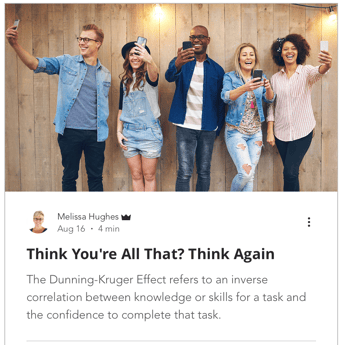"Fake it 'til you make it." We all do it at times. But, do you know someone who is really terrible at something, and he or she doesn't even know it? Not only are they clueless they're terrible at that thing, they are actually quite confident in their abilities to do it? That is a classic example of the Dunning-Kruger effect in action. Basically, what Dunning and Kruger discovered was a cognitive bias that explains why people who are incompetent at something are unable to recognize their own incompetence. Moreover, they’re also likely to feel highly confident that they actually are competent. The irony of the Dunning-Kruger Effect is that the knowledge and intelligence that are required to be good at a task are often the same qualities needed to recognize that one is not good at that task.
Overconfidence is the mother of all psychological biases. It's one of the largest and most ubiquitous of the many biases that skews human judgement. For example, 93% of American drivers claim to be better than average which is statistically impossible. In his 2011 book, Thinking Fast and Slow, Daniel Kahneman called overconfidence “the most significant of the cognitive biases.”
Specifically, overconfidence has been blamed for the sinking of the Titanic, the explosion of the space shuttles Challenger and Columbia, the subprime mortgage crisis of 2008 and the recession that followed, and the 2010 BP oil spill in the Gulf of Mexico. Overconfidence accounts for a wide range of poor outcomes such as high rates of entrepreneurial failure, legal disputes, political partisanship, and even war.
But here’s the thing: we also know that highly confident people are perceived to be more competent, more intelligent and more influential. Despite those social benefits, researchers have identified three pitfalls to overconfidence that can negatively impact your reputation and your relationships.
- The Beginner’s Bubble
When we first learn a skill, our confidence level is typically low. But researchers have identified what they call the beginner’s bubble. We tend to start out with a fairly accurate measure of ability, but after a short period of time, we experience a surge in confidence that doesn’t match up with the performance. Researchers refer to this as the “beginner’s bubble.” That overconfidence is associated with risk-taking and the tendency to overlook warning signs or opportunities to change course.
In a series of experiments in which participants took tests measuring real-world financial literacy, people started off accurately assessing their abilities. But after a very short period of time, their self-assessments become inflated, and they began making riskier decisions that reflected in the poor outcomes.
The 10,000 Hour Rule
In his book, Outliers, Malcolm Gladwell explains that the key to success in any field is practicing a specific task that can be accomplished with 20 hours of work a week for 10 years – or 10,000 hours.
2. Confident or Cocky?
While it’s true that when we are confident we appear more competent, recent studies show that it all depends on how we express that confidence. In a series of experiments, researchers examined how verbal and nonverbal demonstrations of confidence were perceived by others. Those who expressed confidence verbally (“I’m great at this!”) as well as those who expressed confidence nonverbally (body language, posture, and voice) were perceived to be more competent.
However, when participants performed poorly, those who expressed confidence verbally were judged as cocky rather than confident while those who expressed confidence through body language or voice weren’t judged as harshly for underperformance.
- Confidence as Currency
Because we tend to equate confidence with ability or intelligence, it isn’t a surprise that confident people enjoy more promotions, higher status and greater influence– often without merit. But what about the reverse? Are people in higher positions significantly more overconfident? Researchers examined this question in a series of experiments and found that people with status (determined by self-assessments and objective measures) were, in fact, more overconfident than those farther down the totem pole. They were significantly more likely to overestimate their performance in memory, cognition, and knowledge tasks.
The exaggerated belief that leaders are better than they are has huge implications in company culture and organizational performance and company culture – especially if the culture is one where the “boss is always right.” Equating confidence with intelligence is like skipping the meetings and just emailing everyone the outcome.
The Bottom Line:
We tend to associate confidence with happiness and success and a lack of confidence with uncertainty and dubiety. We’ve all experienced situations where we are unsure of our skills, knowledge or abilities as well as those times when we think we’re all that and a bag of chips. And, of course, there is a place for the “fake it til you make it” strategy. Confidence is an important aspect in how others perceive us. What matters is where we get it and how we express it.









